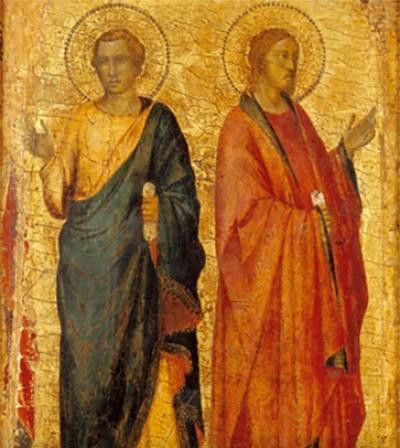
Saint of the Day for 13 August: Saints Pontian and Hippolytus
Reconciliation and martyrdom, two lives intertwined in the name of the Faitha
Name
Saints Pontian and Hippolytus
Title
Martyrs
Recurrence
13 August
Martyrology
2004 edition
Patron of
Troy
Roman Martyrology
Martyred saints Pontianus, pope, and Hippolytus, priest, were deported together to Sardinia, where they both served a common sentence and were girded, as it seems, with a single crown. Their bodies were eventually buried in Rome, the former in the cemetery of Callistus, the latter in the cemetery on the Via Tiburtina.
The Saint and Mission
Saints Pontian and Hippolytus represent an outstanding example of dedication to the Christian mission, despite difficulties and divisions. Both lived in the 3rd century A.D., Pontian was the Pope of the Catholic Church, while Hippolytus was a theologian and presbyter of Rome who became the first anti-pope in history as a result of doctrinal and disciplinary conflicts.
Their history is marked by conflict and division, but also by profound reconciliation. Both were exiled by the emperor Maxentius to the terrible island of Sardinia, known for its harsh living conditions. In this place of suffering, Pontian and Hippolytus were reconciled, putting aside their differences for the greater good of the Church.
This reconciliation is a powerful example of the Christian mission. It shows how the desire for unity and truth can overcome differences and conflicts. Pontian and Hippolytus remind us that the Christian mission is not only to preach the Gospel, but also to live according to its principles, including forgiveness and reconciliation.
Their common suffering and martyrdom in Sardinia further underline their commitment to the Christian mission. Dying for the faith is the ultimate testimony of love for Christ and the desire to follow his way. Pontianus and Hippolytus, in their death, show us that the Christian mission can require the supreme sacrifice of life.
The story of Pontian and Hippolytus is a profound lesson in Christian mission. Despite difficulties and divisions, they committed themselves to living the Gospel, reconciling with one another and giving their lives for their faith. Their testimony invites us to reflect on the challenges and joys of Christian mission, and the transforming power of love and forgiveness.
The Saint and Mercy
Saints Pontian and Hippolytus, two central figures of the 3rd century Church, embody a powerful message of mercy and reconciliation. Initially opposed due to theological differences, they ended up sharing a common fate of exile and martyrdom, an experience that led them to reconciliation and full communion.
Pontian, Pope of the Roman Church, and Hippolytus, known as the first antipope, found themselves united in persecution and exile, destined to share the sacrifice of martyrdom. This story of rivalry overcome and reconciliation is a profound example of mercy in action.
Mercy is one of the most central aspects of the Christian message, and the story of Pontian and Hippolytus vividly demonstrates this. Despite their differences, both were able to recognise the other as brothers in faith, demonstrating the power of forgiveness and reconciliation. This willingness to reconcile is a powerful example of how mercy can transform relationships and lead to peace, even in the most difficult situations.
Their story also reminds us of God’s mercy, which welcomes all the repentant, regardless of their past mistakes. Their example of forgiveness and reconciliation shows us how mercy can work even in the harshest circumstances, bringing truth and love to light.
Saints Pontian and Hippolytus, through their lives, their reconciliation and their martyrdom, are extraordinary witnesses of divine mercy and the importance of forgiveness and reconciliation within the Christian community. Their example challenges us to practise mercy in our lives, to forgive those who have offended us and to seek peace with all.
Hagiography
Hippolytus celebrated the feast together with another martyr saint, Pontianus, to whose events his life was dramatically linked. Pontian sat on the throne of Peter, having succeeded Urban in 230, while the Christian community was enjoying a period of relative tranquillity; Alexander Severus was emperor.
The church was joyfully enjoying its newfound peace when a highly educated priest, Hippolytus, a very strict moralist and…
